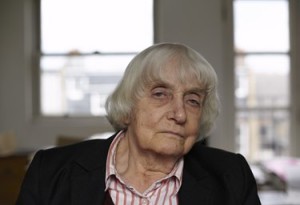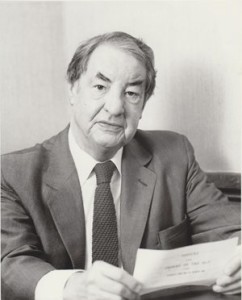
ALCS at 40: Small beginnings, big ambitions
Forty years ago this month, a small group of campaigning writers founded an organisation which now pays out around £30 million a year to its writer members for secondary uses of their works.
In April 1977, ALCS was incorporated as a company and officially launched its mission to defend, and campaign for, the rights of authors. Since its small-scale beginnings four decades ago, ALCS has grown into a vibrant membership organisation with more than 90,000 writer members across the globe, for whom it has now collected almost half a billion pounds in secondary royalties. In a spirit of celebration, we look back at how it all began, drawing on the memories of ALCS founder member and now Honorary President, Maureen Duffy.
In its early days, the company that would become ALCS operated from a series of poky offices, run by a skeleton staff.
The story of ALCS is also the story of a small, doughty group of writers whose unpaid work became the bedrock for many of the rights we now benefit from with each ALCS distribution. Its origins go back to a November evening in 1973, when the members of the year-old Writers’ Action Group (WAG), led by writers Brigid Brophy and Maureen Duffy, gathered at a pub in Chelsea, London.
WAG had reached a crucial point in its young existence. For the past year, the Group had been campaigning for a loans-based, government-funded Public Lending Right (PLR), paid to authors, not publishers, despite significant opposition to the idea from publishers and librarians. That evening, Maureen Duffy announced that WAG’s opponents were seeking to amend the 1956 Copyright Act with the aim of administering a publisher-dominated PLR scheme through a private company. She proposed an alternative scenario, by which WAG members would form an authors’ lending rights society – run by authors, for authors – to administer PLR. A hat was passed round to collect donations for this worthy new cause.

A month later in December 1973, having raised a total of £100, the Authors’ Lending Right Society (as it was first called) was founded. For the next several years, the Society continued to campaign vigorously – on a shoestring – for a PLR scheme. In 1979 came victory as The Public Lending Right Act was passed as almost the final act of the Labour government, just before Margaret Thatcher came to power. However, it had previously been made clear to the Authors’ Lending Right Society that it would not be allowed to administer PLR itself. “It was government money and they had to set up a quango to do it,” recalls Maureen Duffy, in conversation about those early days. Nevertheless, the important principle of remunerating authors directly for secondary uses of their work had been established.
And by now, the Society – officially incorporated as a company now called the Authors’ Lending and Copyright Society Limited on 26 April 1977 – had established several other important aims. Among them: to collect cable TV dues; to negotiate the payment of overseas PLR to UK authors; and to tackle the growing issue of photocopying. “I was aware that photocopying could potentially be extremely damaging to writers’ incomes and indeed, to their moral rights as well. Because there was no control over it whatsoever,” remembers Maureen Duffy (pictured right). The principle held by Maureen and her fellow campaigners was encapsulated by the slogan “No Use Without Payment”.
We can celebrate the fact that if ALCS wasn’t there, we would need to invent it … And that we have gained a sense of some sort of common purpose.
In its early days, the company that would become ALCS operated from a series of poky offices, run by a skeleton staff. It produced its documentation on a manual typewriter “with sticking keys”. Looking back, the sheer dedication of those involved is remarkable. When the company began to receive payments from Belgian collecting society SABAM for cable television rights, staff identified the scriptwriters who were entitled to a share of it by trawling through hundreds of back copies of the Radio Times. Distribution of monies subsequently became much easier with the advent of computer systems!
Maureen Duffy is keen to emphasise that the campaign surrounding the establishment of ALCS would have been much harder, and may well not have succeeded, without the support of Lord Ted Willis – playwright, novelist, screenwriter and the first ALCS chairman. “He could open parliamentary doors for us, table questions and bills in the Lords and, along with Michael Foot, get us the support of Prime Minister Jim Callaghan and the Labour government. This provided we could also get TUC support which I managed to do at the TUC Brighton Congress in 1978. I still have my delegate’s badge.”
Lord Willis of Chislehurst, aka ‘Our Ted’, Novelist, Playwright, Politician and first Chair of ALCS
1982 brought the creation of the Copyright Licensing Agency (CLA), a joint venture between ALCS and the Publishers Licensing Society (PLS) to issue licences, collect the revenues produced and distribute them to their members. The equal stake of authors hold with publishers in this model was, and remains, vital. Closer working ties were also established with the Society of Authors, the Writers’ Guild of Great Britain and later the National Union of Journalists, and these essential relationships with fellow writers’ organisations are fostered to this day.
In 1987, it was decided that the name ‘Authors’ Lending and Copyright Society’ no longer encapsulated the many aspects of the work the company was now undertaking on behalf of authors, and it was renamed ‘The Authors’ Licensing and Collecting Society’: the title by which its 90,000 members know it today.
How were the first ALCS members recruited? The answer is: by dogged word-of-mouth dissemination: writing articles; turning up at Society of Authors AGMs; sending round newsletters; taking to the streets and staging demos. “It was very grassroots,” says Maureen Duffy. “We also lobbied Parliament and gathered sympathetic MPs who could then raise questions in the Commons.” This parliamentary work would one day lead to the formation of the All Party Writers Group (APWG) in 2007.
Over the past four decades, ALCS has grown out of all recognition from the organisation first mooted in a Chelsea pub in 1973. Everything has expanded, from its staff and the number of territories it now administers payments from, to that grassroots lobbying work which extends all over the world, notably via the International Authors Forum (IAF), of which ALCS is a founder member.ALCS now has highly sophisticated computer systems for the management of multi-media rights in the digital era. And most importantly of all, it has collected almost half a billion pounds for authors.
…being a writer, as you know, can be an extremely lonely occupation.
The essential ALCS ethos remains unchanged, however. “The same thing applies: No Use Without Payment,” says Maureen Duffy, the sole surviving member of the original founders of WAG. She is quick to point out that its 40th birthday year is no time for ALCS to rest upon its laurels. “It absolutely isn’t, I’m afraid. But we can celebrate the fact that if ALCS wasn’t there, we would need to invent it. We can celebrate the fact that we have collected a huge amount of money for writers that they otherwise would never have had. And that we have gained a sense of some sort of common purpose. Because being a writer, as you know, can be an extremely lonely occupation”.
At 83, Maureen Duffy remains an active campaigner. On the day of our conversation, she has been attending an ALCS meeting with the British Copyright Council. “We were laying down our strategy for talking to the Department of Business, Energy and Industrial Strategy about what we want them to do to preserve the status quo of copyright in this country. For instance, if they were too keen to do a deal with the US, which involved a relaxation of copyright law, then that could be disastrous,” she says.
What has motivated her to be such a hardy campaigner? “I’ve always been interested in politics and there’s a sort of bloody-mindedness in me that wants to take issues on. It’s a continuous battle. As well as authors’ rights, I’ve also been a campaigner for gay rights and animal rights. I’m a natural bolshie, but I also feel very strongly that you have to stand up and play your part.”
Today, it is easy to take for granted the right, encapsulated, for example, in the front of every newly published book by the phrase “The right of (name) to be identified as the Author of this work has been asserted by him/her.” But without the indomitable efforts of the original founder members of WAG – Brigid Brophy, Lettice Cooper, Francis King, Michael Levey and Maureen Duffy – by their successor campaigners at ALCS, and by other organisations that represent writers, the principle it enshrines would be much less recognised. By politicians and other policy-makers; by the institutions, organisations and media that make use of our works; and by the public at large who enjoy and learn from them.
Throughout the year, ALCS News will celebrate its significant birthday with a host of features which reflect on the company’s work over the past four decades, and not least, the works of you, our members.
By Caroline Sanderson
Read The ALCS Story: 1977-1997
We would like to acknowledge The ALCS Story: 1977-1997 by Joyce Marlow – herself a founder member of the original ALCS – as source for this article.
With thanks to Joyce Marlow for giving us permission to reproduce it; this book on the first 20 years of ALCS is now available for members.
Picture credits
Maureen Duffy: © Nia Hughes
Lord Willis: © UPPA
ALCS 20th Birthday party pictures: © Bill Johnson Photography
